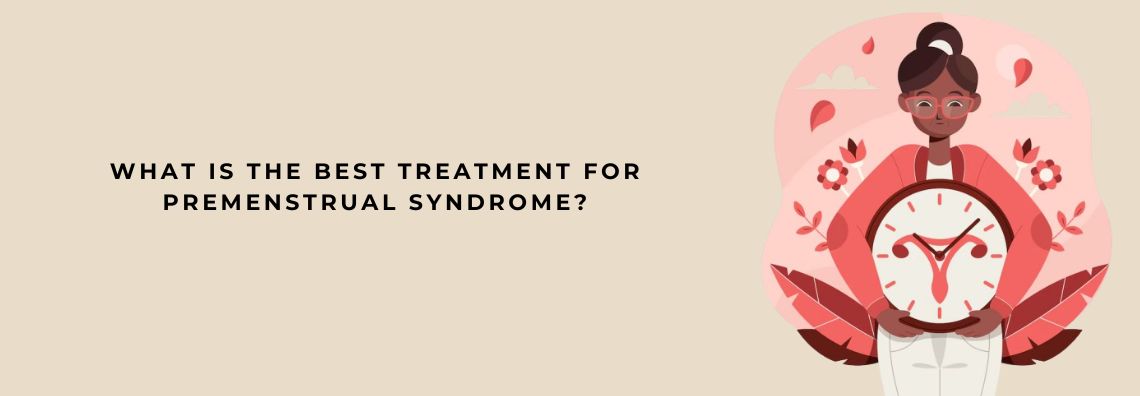
Some women experience in the days leading up to their period some physical and emotional symptoms, typically starting a week or two before menstruation and subsiding shortly after it begins, this is what we call premenstrual syndrome (PMS).
PMS is thought to be related to changing hormone levels during the menstrual cycle, particularly the decline in estrogen and progesterone after ovulation.
Are there any treatment plans for PMS? Are there any tips to deal with this condition? Yes.
We will cover the best treatment for premenstrual syndrome including some lifestyle changes like a healthy diet, regular exercise, stress reduction techniques and sufficient sleep.
The Best Medical Treatments For PMS
The treatment options may vary from person to person with the best approach tailored to individual needs and symptom severity. The best medical treatment options for PMS include the following:
Over-The-Counter Medications
To get relief from physical symptoms like cramps, headaches and backaches, healthcare professionals often recommend over-the-counter medications. Take a look at the following information:
- Pain relievers, such as ibuprofen, naproxen, and aspirin, can help reduce the pain associated with menstrual cramps and other PMS symptoms.
- They work by reducing inflammation and blocking the production of prostaglandins, which are hormones that can cause pain and inflammation.
- Besides pain relievers, some people find diuretics helpful for bloating and breast tenderness, while others use heat wraps or heating pads for cramps.
- If you are still not getting relief and symptoms are severe, it’s important to consult with a PCOS specialist for further evaluation and treatment options.
Certain lifestyle changes or tips can be provided by healthcare professionals to help you with PMS.
Prescription Medications
Prescription medications for PMS are used to manage severe symptoms, particularly when lifestyle changes and over-the-counter remedies are insufficient, and can include hormonal birth control, antidepressants, or diuretics.
If PMS significantly affects daily life and causes intense physical discomfort or emotional distress, prescription medications are advised by the professionals. Here is how prescription medications can work:
- Hormonal birth control can help regulate the menstrual cycle and reduce physical symptoms like bloating, breast tenderness, and heavy periods.
- Antidepressants or SSRIs can address mood swings, irritability, and anxiety associated with PMS, particularly in cases of premenstrual dysphoric disorder (PMDD).
- Diuretics can help reduce fluid retention and bloating.
- Danazol is a synthetic hormone that can be used to reduce breast tenderness.
- Nonsteroidal anti-inflammatory drugs (NSAIDs) can help relieve pain and inflammation.
- Gonadotropin-releasing hormone (GnRH) agonists can be used for severe, refractory PMS with or without add-back therapy to address hypoestrogenic adverse effects and concerns about bone health.
We have now talked about the medications but keep in mind that these medications can only be taken after expert advice and prescription so do not rush and consult with a specialist first. Moving ahead discover the lifestyle changes that can help you with PMS.
Lifestyle Suggestions for PMS
To alleviate PMS symptoms lifestyle changes can help in many ways and these can result in better physical and emotional support. Here is what you can do for your PMS:
Dietary Adjustments
A balanced diet is a way to deal with several disorders including PMS. When you eat healthy your body remains happy. So, prioritise fruits, vegetables and whole grains rich in iron, fibre, calcium and magnesium.
Limit your salt intake, this can help you reduce bloating and fluid retention. Caffeine and alcohol can worsen the physical pain and irritation. Sleep problems might follow if you are not limiting your caffeine intake. Add more calcium to your diet because calcium-rich foods or supplements may help reduce PMS symptoms.
Regular Exercise
Routine exercise is a better way to deal with stress and improve mood. Aim for at least 30 minutes of moderate activity most days of the week. Even walking and cycling can improve your health and lift your mood. Yoga, meditation and other relaxation exercises can help reduce stress and improve overall health.
Managing Stress
Stress can worsen PMS symptoms like mood swings, fatigue, and bloating, potentially making the period more challenging. Yoga, meditation, deep breathing exercises and progressive muscle relation can help you deal with PMS symptoms. Aim for 7-9 hours of quality sleep each night to beat stress. Take good walks friends, write in a journal or engage in hobbies to relieve stress.
Smoking is not good in any way. Avoid smoking because it may worsen PMS symptoms. Supplements like vitamin B6, calcium and magnesium may be beneficial for some individuals which is why consulting a PCOS specialist is always a wise decision.